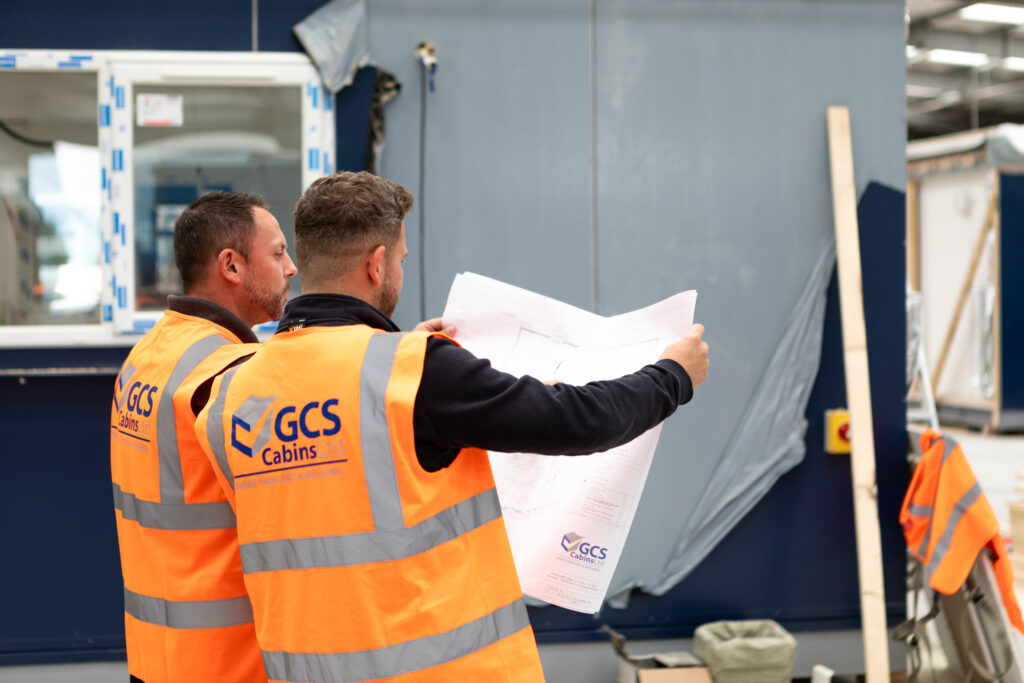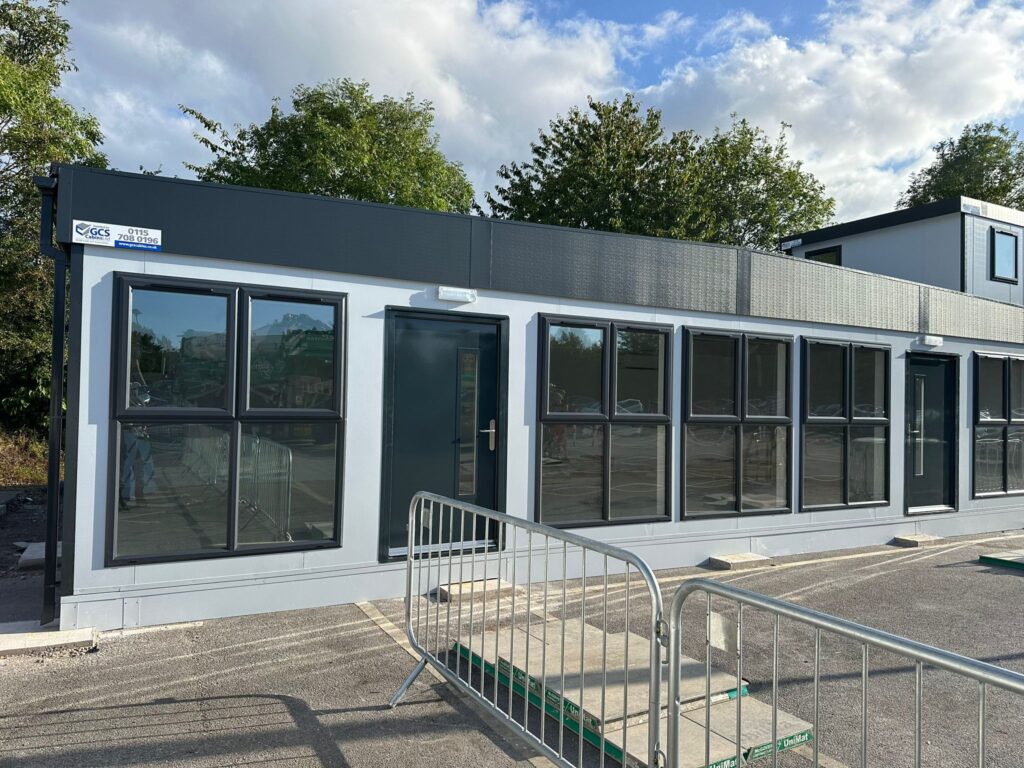The demand for innovative and sustainable infrastructure is reshaping the construction industry. Modular buildings are leading this change with its offsite construction method. Manufacturing parts of buildings in a controlled, offsite environment before assembly on location has transformed how we think about construction. Modular buildings in the UK are proving to be a smarter, greener and more innovative solution for businesses, schools, healthcare facilities, and more.
The Offsite Modular Building Manufacturing Process
Offsite construction, or modular construction, involves creating building sections—referred to as modules—in a factory setting. These modules are then transported and assembled onsite, whereas traditional construction takes place on the final site. Here’s how offsite manufacturing of modular buildings brings increased efficiency, precision, and sustainability:
1. Precision and Quality Control
By constructing modular buildings in a dedicated factory, manufacturers can gain greater control over every aspect of production. This precision leads to higher-quality buildings that are more durable and better able to meet specific safety and performance standards. Furthermore, factory-controlled environments reduce the likelihood of errors or inconsistencies, helping ensure that each module is produced to exacting standards.
2. Optimised Resource Use and Waste Reduction
Offsite manufacturing is designed to use materials efficiently, resulting in less waste overall compared to traditional construction. In traditional onsite builds, materials like concrete, steel, and wood are often left unused or are damaged due to weather exposure, adding to project costs and environmental impact. By contrast, modular buildings are produced in an indoor, controlled environment where materials are precisely measured and handled to avoid excess. This approach to managing materials is beneficial not only for the environment but also for the project’s overall budget.
3. Enhanced Collaboration and Streamlined Communication
Offsite construction relies on a streamlined and coordinated workflow between architects, engineers and builders. The modular construction process allows for better planning and coordination from the start. Everyone involved in the project has a clear understanding of the project requirements and timelines. This level of collaboration can prevent costly delays and possible rework that can often occur in traditional, onsite construction.
4. Weather-Resistant Production and Reduced Risk of Delays
Weather conditions can cause significant setbacks in traditional construction. Rain, snow and extreme temperatures can affect both the timeline and quality of the final product. With modular construction, building components are constructed indoors in a controlled environment, insulating the entire process from unpredictable weather. This means fewer delays, more consistent progress and ultimately faster project completion.

A Greener Approach to Building
With environmental concerns on the rise, the sustainability of offsite construction is one of its most significant benefits. By embracing modular construction, companies and individuals can contribute to a greener future.
1. Lower Carbon Footprint
The streamlined efficiency of modular buildings in UK manufacturing results in reduced energy consumption and a smaller carbon footprint. Since modules are created in one location and transported only when complete, transport-related emissions are lowered. Traditional construction requires materials to be shipped to the site multiple times over the course of a project. In fact, modular construction has been shown to reduce carbon emissions by up to 40%. Modular buildings are an environmentally responsible choice for sustainability.
2. Built-In Energy Efficiency
In addition to reducing waste, modular buildings are designed with energy efficiency in mind. Since they are constructed in a controlled environment, materials like insulation and windows are fitted in ways that optimise energy use. This means that modular buildings are often more energy-efficient than traditionally built structures, leading to significant energy savings over time. This results in lower utility bills and a reduced environmental footprint for end users.
3. Reuse and Recycling Potential
Modular buildings are designed to be highly adaptable, meaning they can be dismantled, moved or reconfigured to serve new purposes over time. This flexibility supports circular economy principles, which prioritise reusing resources wherever possible. By designing modular structures with repurposing in mind, manufacturers make it easier to give buildings a second life. Owners can relocate modules to a new site or use them for an entirely new purpose.
Smarter, More Cost-Effective Buildings
The advantages of modular construction don’t stop at the manufacturing process. The benefits include high-quality, cost-effective and adaptable buildings that can be tailored to specific needs.
1. Reduced Costs and Faster Build Times
The efficient production and assembly of modular buildings means lower costs and faster project completion. In fact, modular construction can reduce build times by up to 50%, allowing organisations to open their doors and begin operating sooner. This is a great advantage for businesses, educational facilities and healthcare providers. Project planners and business owners rely on predictable timelines and efficient use of funds. The savings in both time and money can have a positive impact on operational budgets, freeing up resources for other important investments.
2. Flexible, Customisable Design Options
Flexibility is one of the most appealing aspects of modular buildings for end users. With modular construction, buildings can be designed to adapt to a wide range of specifications, allowing for custom layouts, finishes, and functionality. As needs change over time, modular buildings can also be expanded or modified more easily than traditional structures. This means facilities can grow and evolve quickly in response to changing demands.
3. Durable, High-Quality Construction
The controlled, standardised production of modular buildings in the UK ensures they meet strict quality standards. This process results in a durable and reliable structure that requires less maintenance over time. For business owners, this means reduced repair costs and less frequent need for replacements, protecting their investment and ensuring a long-lasting building.

Innovative Structures with Modular Construction
The adaptability and ease of customisation means modular construction presents more innovative designs and approaches. This level of flexibility allows project planners and business owners to explore new possibilities in modular design while maintaining affordability and reliability. With the growing integration of smart building technology and environmentally friendly materials, modular building manufacturers can meet the evolving demands of the construction industry, delivering more innovative, more sustainable buildings that lead the way toward a greener future.
GCS Cabins Supply Sustainable Modular Buildings
As the demand for sustainable, efficient building solutions grows, modular construction has become a viable and forward-thinking option. GCS Cabins helps businesses and organisations achieve high-quality, adaptable buildings that meet their needs while promoting sustainability goals.
Through offsite construction, we’re not only creating smarter, greener infrastructure but also building toward a future that balances quality, innovation, and environmental responsibility.
Speak to a member of our team today to find out how we can provide cost-effective and sustainable modular buildings.






